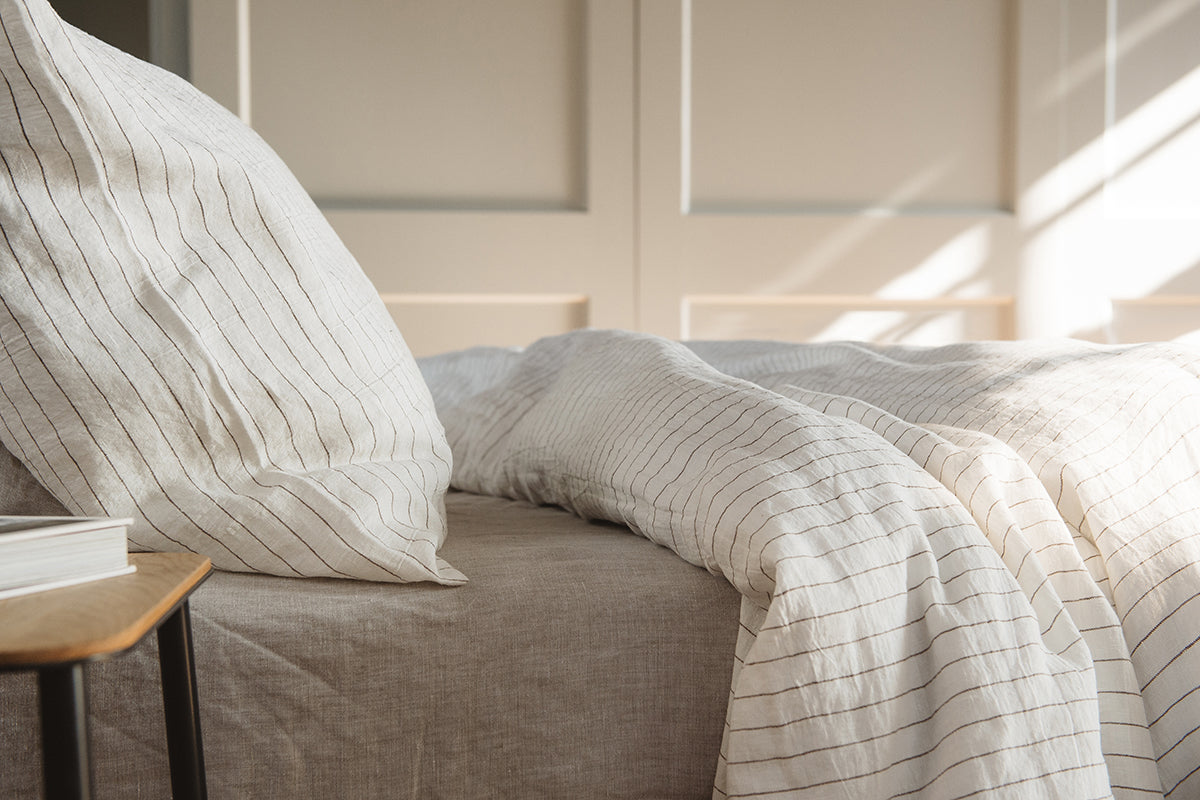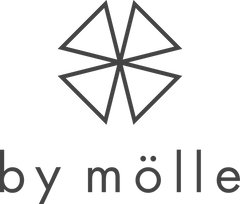Linen, mohair, hemp, wool, alpaca in soft earthy tones are not only beautiful but also sustainable and healthy with a positive ecological impact. Pure nature and a craft tradition of thousands of years. Here are the most beautiful natural materials from our collection.
1. linen
Linen is 100% natural and wonderfully soft and the most sustainable textile. Linen is made from the flax plant. Yarn is first spun from the fibers of the stems and then woven into fabric. Linen is the only plant-based textile in Europe. Flax grows well in the Atlantic climate without irrigation and pesticides, so it is very environmentally friendly and healthy. After the flax harvest, one of Europe's oldest linen weaving mills gets to work for us. The craftsmanship goes back more than a hundred years. The entire process - from flax to linen - is traditional, which is reflected in the beautiful natural tones of our linen fabrics. Discover the By Mölle collection of linen curtains. Specially woven for us from the best quality European flax. All cushions, bed- en table linen are handmade in our atelier in Dalfsen. 2. mohair
2. mohair
Mohair is one of the most luxurious types of wool you can find for scarves, plaids and blankets. It comes from the angora goat and is super soft. Anyone who sees an angora goat often thinks it is a sheep. The woolly coat is lush and curly. The goat is sheared twice a year, in spring and autumn. The climate, nutrition and health of the Angora goat determine the high quality and silky shine. The name Mohair is derived from the Arabic word Mukhaya. The angora goat is an ancient breed and appears on mosaics dating back to 2500 BC. Mohair is known for its durability and softness. Wonderfully thick, warm and soft with a special satin sheen. Mohair is a pure natural product and thermo-regulating. Light and airy in summer and warm in winter. Very nice, the wool does not itch or irritate your skin. Our mohair throws and blankets are handwoven in Europe by a traditional family business that is certified for animal-friendly practices and sustainable production. Shop mohair throws and blankets. 3. alpaca
3. alpaca
Alpaca wool is one of the most luxurious types of wool in the world. That's because alpaca wool is super soft and feels like silk. Alpaca wool comes from the alpaca, family of the llama. In addition, alpaca wool does not contain lanolin, is hypoallergenic and is the lightest and most thermal of the natural fibers (one layer of Alpaca fleece corresponds to approximately 5 layers of standard wool). The fibers are strong and durable and also naturally repel dirt and odor, meaning you hardly need to wash it. Shop alpaca throws, blankets and scarves. 4. undyed organic cotton
4. undyed organic cotton
Looking for pure natural towels? Treat yourself with our organic undyed bath collection. Undyed literally means undyed, because the towels are woven with undyed, organic cotton in the natural light shade of the cotton plant. No paint, no synthetic chemicals and no microplastics are used. So wonderfully soft and clean for for your skin, made with respect for the earth. A next step in our mission to make the world and your home a little more beautiful and sustainable. Shop the undyed bath collection.
5. recycled down
Down is light and airy and insulates and ventilates extremely well. Down is precious and often mixed with small feathers. That is why the down content is always stated. A real down duvet consists of at least 65% down. The more down, the lighter and warmer (and more expensive) the comforter. Down is the softest part of the plumage and usually comes from geese and ducks. The colder the area of the birds, the warmer your duvet. Good quality down has a self-regulating capacity and can adapt to the climate. As a result, a real down duvet is cool in the summer and warm in the winter. Down and feathers were always reused in earlier times. Families would remove the down from the comforter if the cover was damaged. They washed the down, added some extra down and made a new duvet. No need to throw away. Shop eco bed bascis. 6. kapok
6. kapok
Kapok has been used for thousands of years and is great as a vegan pillow. Kapok is 100% vegetable. The soft, cottony fabric is the fluff-like coating of the seeds of the kapok tree, which can grow up to 70 meters high. The kapok tree grows wild in the Caribbean, Central and South America and West Africa. The tree looks a little different per continent. Kapok is suitable for cushions. It forms well and is firmer than down. Kapok is self-cleaning and you do not have to wash it, because then the natural wax layer of the kapok fiber can be damaged. Shake your pillow daily to air it out. You can wash the cover and if a pillow loses its resilience, you can order kapok refills that will make your pillow feel fresh and like new again. Due to the natural wax layer, kapok is hypoallergenic. Furthermore, it is odorless, moisture-regulating, breathable and an environmentally conscious choice. Because kapok trees only grow in the wild, kapok does not contain any pesticides. That sleeps nice and clean and healthy. Shop vegan kapok bed basics.
7. recycled denim collection
Every year, we throw away 210,000 kilotons of textile in the Netherlands. We would like to change that. That is why we give denim a second life by spinning the textile fibers into a new high-quality yarn after removing the zippers and buttons. We have these made into beautiful, soft plaids and cushions in a traditional knitting shop. Because we use the original colors of the denim fabric, dyeing or bleaching of the fabric is not necessary. Eco-friendly and a good alternative to cotton in your home. Shop the recycled denim collection. 8. wool from the Gotland sheep
8. wool from the Gotland sheep
The soft wool for plaids and blankets comes from the Gotland sheep from Scandinavia. An old Swedish breed of sheep from the island of the same name and special because the fur is actually a fur that you can spin well. The wool has a beautiful shine and luxurious appearance and feels nice and soft. The sheep are sheared twice a year to prevent the wool from felting. It is a beautiful quality wool that we use in the natural pure colors. According to tradition, the Gotland sheep originated from the mixing of different sheep breeds that the Vikings used to take back on their raids around 800 AD to 1066. The result is a strong sheep known for its liveliness and intelligence. An elegant sheep, which, when freshly shorn, resembles a doe. The wool is highly curled and soft with naturally mixed gray and brown colors. Shop Gotland wool plaid.
